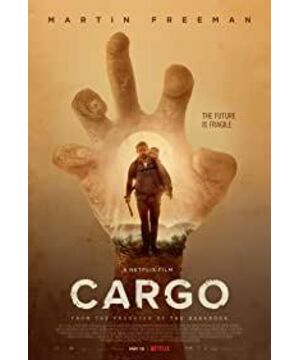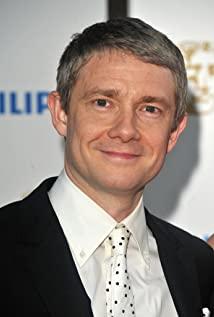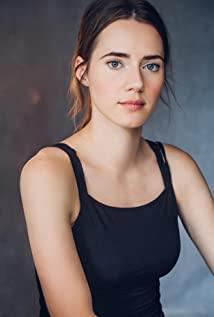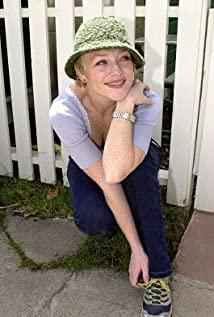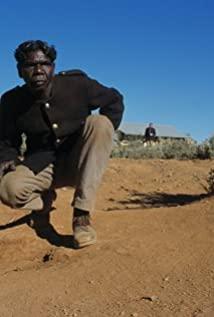As soon as the alarm clock at 6 o'clock in the morning, I woke up and started to wait for the broadcast, and I finished watching it as soon as possible. I cried like a dog, I cried and thought about my mother today, I have to go to school on Friday, how am I going to spend my day, and then I cried even more fiercely...
After calming down for a long time, I started to write.
First of all, the theme of father's love makes me cry every time I see it.
Secondly, I can't particularly objectively evaluate the film of the male god.
Let’s talk about the potential problems of short-to-length films first.
There are quite a few examples of short-form adaptations of feature films in my mind, but most of them didn't turn out well. At present, Cargo seems to be OK (of course, I also saw some short reviews that felt boring after being elongated). In my opinion, Cargo does have some unavoidable problems as a feature film, but I want to talk about the good points.
Cargo was originally a high-scoring short film from Youtube. This kind of short film released on the Internet platform is very different from the feature film in the theater. While watching a short film, you have the right to quickly turn it off and forget about it. A successful short film will have an exquisite story core, but often a single and clear theme is laid out at the beginning, and all other settings are served around this general direction--characters, scenes, music, clip. It is undeniable that some short films will have some technical highlights or some very clever settings, but most short films win with stories, a story that can let the audience know the direction of the story in ten seconds and can explain it clearly in a few minutes.
Therefore, when developing short films into long films, there will be some creative problems. When we see some excellent short videos worthy of our forwarding on some social media, most of the time after watching, we will feel that the story is very good, very complete, or moving or interesting or resonates with other emotions. But after reading it, I want to know more about the cause and effect of the story, and there are not many other branches of the character. To be honest, when I saw Cargo many years ago, I was also moved and liked it, and I didn't feel that I was looking forward to seeing more of this story.
The reason is, first of all, because the story in the short film is complete, the cause process is climax, the single-threaded narrative is simple and clear, and it has been clearly described in the original length of the short film. Secondly, the shaping of the characters, the role of the story is actually very simple, the motivation of the characters to promote the development of the story is the father's love, it is simple and clear, and it is popular, so there is no need to repeat it. It is suitable to be placed in the short film. This character does not need to have too complicated character experiences or character relationships. As long as he is a father, all other feelings are brought out by this simple character relationship. Knowing the other aspects of the father will not have any influence on the story development of the short film, so the length of one short film is enough. The last thing is the rhythm. When the characters are clear, the motives are clear, and the story is clear, the rhythm of the film is just right within a few minutes of film length. Therefore, a short film is very different from a feature film. Being successful as a short film does not necessarily mean that the short film will be successful after it becomes a feature film. Personally, Cargo is relatively successful in this regard.
Let’s talk more about the adaptation of the feature film.
Because of Lord Chao, I have been paying attention to this film since the early preparations of the film. Through stills, previews, and interviews, I generally learned about the content added after the film adaptation. In short, a new story line has been added - the indigenous people. I was a little curious at the time, and even had a little fantasies about the ending of a perfect ending (still reluctant to watch the character played by Chao Ye die). The feeling after watching it is. The setting of the two story lines is actually quite subtle when you think about it carefully, and there is nothing wrong with it. As a local low-budget film, I would also love to see the indigenous culture of the day in the film. The downside is that the connection between the two storylines is a little abrupt, and Cargo's story as a feature film is slightly less exciting than the original short.
The first meeting of the lines between Andy and Thoomi happened shortly after the movie, without the assistance of other characters, stemming from the car accident and the first confrontation between the two after the car accident. The setting here makes me a little happy. The more the two story lines intersect, the more emotional fetters will be left when Andy and Thoomi walk together. After that, the school's female teacher brought the two lines together again. This is not only to pave the way for the little girl behind Thommi to finally want to go home, but also to once again imply that the protagonists of the two story lines will eventually meet. It was Vic who finally brought the two together afterwards, and some of the abruptness caused by the unsmooth storyline came from this place. But another significant effect of Vic's presence on the complexity of the story is to add complexity to Andy's 'mission', because he makes Andy realize that he not only needs to get his daughter to a safe place, but also needs to Entrust it to someone you trust. This eventually led to the final fusion of the two storylines of Andy and Thoomi, that is, Thoomi's tribe refers to the place where Andy trusts the safety of his daughter.
Of course, the filling of the story is far from enough for a feature film. So the richness of characters was introduced. The enrichment of characters can be divided into two aspects. One is the increase in the number of characters. As the storyline increases, so does the number of characters in the story. From one father and daughter to two. This is an intuitive enrichment of the character.
One is the three-dimensionalization of characters, which is also an aspect that is more important than the increase in number. It is actually a very difficult process to supplement the existing role of Andy in the short film. After all, Andy's motive is very single, that is, to send his child to a safe place and entrust it to someone he can trust for adoption. But the points made in the feature film are handled well in my opinion.
First of all, Andy's motivation is a process of change, from taking good care of his wife and children, to taking the children to seek a livelihood for his wife, to sending the children to a safe place, and then to encountering Lorraine all the way to try to help but fail. , meet Thoomi again and send both children to safety. Although the general direction has not changed - seeking safety for the family - but through small changes step by step, this role has gradually become three-dimensional.
Secondly, because of the richness of the plot, the characters are given more emotion. Along the way, Andy meets many people, a friendly and wary middle-class family living by the river, a kind old teacher who finally arrives at an abandoned school, Lorraine, a desperate girl who has lost her sweetheart, Vic, a violent speculator, and Thoomi. Everyone helped Andy's role to be richer, and the old teacher helped the sick Andy to cheer up. As an ordinary father, Andy's only motivation was his own children, and he had long been holding back despair. The story of Andy's encounter with Lorraine and Vic afterward highlights the moral level in Andy's heart. He is not a person who will do anything just for the safety of his children, but a person who can stick to his moral bottom line in desperate situations. Later, when he met the middle-class family by the river again, the father, who had already been infected, tapped Andy's greater courage. And the appearance of Thoomi made Andy expand the 'father's love'. Due to the addition of other characters and the addition of more plots, the role of Andy was finally developed into the three-dimensional protagonist image required by the feature film after trying to avoid repeated narration or exaggerated sense of powerlessness in the development of the story. Although it is not as good as it is, I personally think it has done a good job.
The director of the film has mentioned many times in interviews that for Andy's role, he needs a person who has no 'heroic baggage', but at the same time has a strong persuasive power to make the audience believe that he is enough to deal with such a situation. Based on the above requirements, the director found Martin to play this role. As the director said, Martin and the director worked together to get the role right. Neither does it use the very capable setting of the 'perfect protagonist' in the traditional film narrative to highlight the role, nor does it deliberately pursue the truth of the process, resulting in a lack of convincing in the process of the later film gradually reaching its climax. The overall control and setting of the director (and the screenwriter) is one aspect, and Martin's personal handling of subtle details is also another aspect. [If you have time and are interested, you can choose a few paragraphs to analyze, but just look at the mood, I feel that writing it is also self-happiness. 】
Finally, let's talk about the arrangement of the two father-daughter story lines, two infected fathers, and two girls in danger. The relationship between Andy and Thoomi comes from this similar character relationship and situation to some extent. The movie even bluntly sets up some of the same lines like 'this looks like spaghetti' to bring the two people closer together. Through this treatment, the sense of distance between the two people is narrowed, and the development of the two story lines after they meet becomes more reasonable.
Overall, the complexity of the narrative and the richness of characters make this one-and-a-half-hour feature less boring. Although the rhythm control is indeed not as good as the short film, it is still a good story film. In terms of movie types, it is a rich supplement to this type of movies. After all, zombie movies are slightly monotonous in my impression. For the film itself, the photography and editing are not very good, and there is nothing that feels inappropriate. The only obvious intuitive feeling is that the color correction is a bit too much in the later stage, which may be related to the shooting cost. The music is flawless. It can be felt that the local indigenous elements are deliberately arranged, but it does not follow the narrative structure closely. It is only stylized to reflect feelings, but it is slightly loose and wasteful.
The movie has a three-and-a-half star rating. One and a half stars are used to chase stars. Yep.
Finally, I want to say a few more words. As Martin's 'brainless fan', I have seen comments about Martin many times. It is nothing more than 1. Martin's characters are all the same ordinary people/good guys; 2. Marin makes too many small movements during the performance. Under normal circumstances, as a Buddhist powder, it is chosen to be ignored. But now that I have started writing a long review, I should take the initiative to raise these two doubts that are untenable in my opinion, and briefly refute them. First of all, the definition of ordinary people/good people is actually very broad. There are 7.5 billion people in the world, and ordinary people must account for 7 billion. Among the 7 billion people, even if there are 3.5 billion good people, you cannot say that all 3.5 billion people are the same. Unlike those extraordinary people, the difference between ordinary people is reflected in the details, and in a sense, it is more difficult to control. So the statement 'the same ordinary people/good people' doesn't make sense in itself. Secondly, there may be some unobjective views. Sometimes the audience feels that your role in this movie is the same as the role you played before. To some extent, it seems that it may be because a certain role is deeply rooted in the hearts of the people. Chao Ye's early office did not have a large international audience, so I will not mention it for the time being. According to my personal experience on the Internet, starting from Sherlock, people who like Sherlock first saw Huo When Bitman made a comment that he was like Watson, and after the end of the three Hobbits, many viewers commented that they saw the shadow of the Hobbit in Agent Ross in Black Panther. If you look at all of Martin's works, in fact, each character is very different. As for the issue of small movements, I just want to say that when the trial of the action lines and expressions is in line with the characters in the film, then any problem should not be called a problem. If it must be taken out as a problem, it can only be said to be a negative opinion brought about by stereotypes. To quote a quote from a previous post:
A new trailer for Cargo is out. I saw that many people were talking about the name of the little girl in the film. I was really speechless at that moment. I want to scold people, but unfortunately I'm a coward.
Sometimes I wonder how many fans really take Chao Ye as an independent actor.
When I saw him in SD, he took every fan seriously and worked hard to meet everyone's requirements. Sometimes I would feel unfounded and think it's really not worth it for him.
After Bruiser and The Office, people thought he was going to be stereotyped as a comedian, walking between 20-minute comedies on TV; but he didn't, he went and made movies, Ali G, Love Actually, The Hitchhiker's Guide to the Galaxy, and people thought he had His comedy talent developed from the small screen to the big screen; but he still did not stop, he played the night watch, and cooperated with director Peter Greenaway, a famous British artist-level director; He played a man whose soul turned into a woman in The Wrong Body, a producer under multiple pressures in The Eichman show, and a detective who insisted on his professional ethics for half his life and eventually went astray in Start Up... He His role has always been changing. He shoots TV and movies, but also sticks to the stage. He shoots Hollywood commercials and low-cost independent productions. He never stopped the works that he found interesting, but some people couldn't see them.
He said in the interview that he was willing to accept more taxes from people like him because he felt he was making a lot of money while many others had a hard time. In the interview, he encouraged young people to stick to their dreams, because sticking to their dreams is very hard, and it may not be successful. He said in the interview that he knows that some people don't like him, but this is his job. He can't do anything to make others like him. That's not his starting point. But people don't care about the lack of clicks, and the old and unknown works.
The star industry is terrible, he has to cut a part of himself for others to see, and what the public sees is the points that have been cut open. Some people see this, some people see that. Some see more, some see less. So it can't be said that other people's views are wrong, because what we see is one-sided, and no one can say that I understand him 100%. In the same way, no one stipulates that people who have only seen one of his works cannot say that they like him, and no one stipulates that as a fan, what must be done, but I always think that it is, at least treat him as an individual actor Let's take a look.
View more about Cargo reviews


